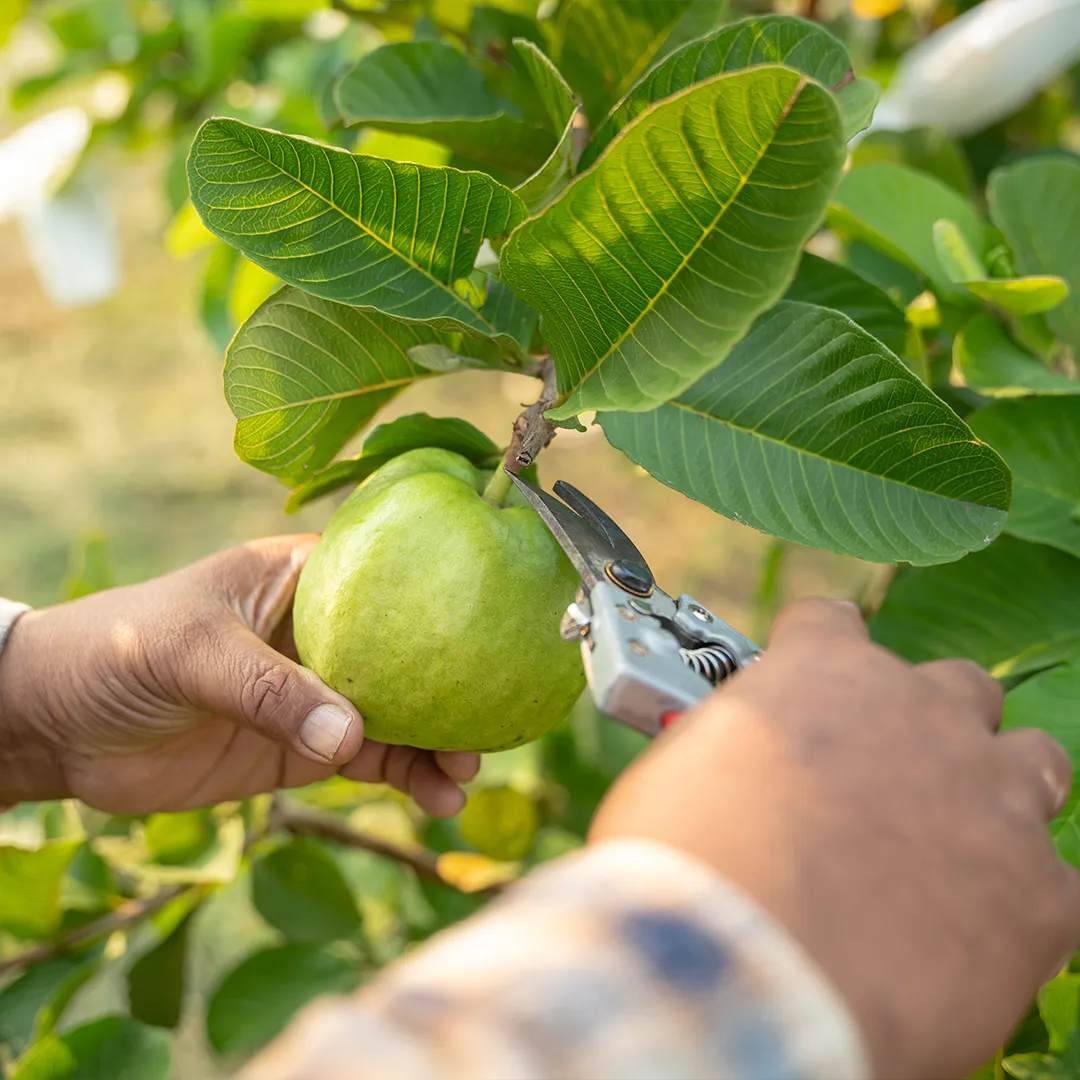
rubyni® Zinc
Zinc – the trace element for health and beauty
Who doesn’t dream of clear skin, beautiful hair and strong fingernails? Most people also want mental vitality, good vision and a functioning immune defence system. Zinc is a helpful building block for all these desires.
This vital trace element supports your health in many ways: Skin, hair, nails and bones need it to stay strong and vital. But your mental performance, your eyesight and your immune system also depend on zinc.
With rubyni® zinc you can specifically prevent a zinc deficiency – vegan and from a natural source.

rubyni® Zinc: Zinc from a natural source
- For the health of hair, skin, bones and nails1
- Promotes normal vision and can alleviate night blindness1
- An important building block for a good immune system1,2,3
- Supports your mental performance (cognitive function)4,5
- Zinc from organic guava leaf extract, bound in natural form
- Two capsules provide you with 10 milligrams of zinc
- Combined with vitamin C from organic acerola fruit powder
100% vegan, lactose- and gluten-free; 100% organic
rubyni® Zinc supports your health and well-being in a 100 per cent plant-based way: our vegan capsules contain high-quality organic guava leaf extract. It provides you with the important trace element zinc every day.
We have combined the zinc extract with natural vitamin C from organic acerola fruit powder. This allows your body to absorb the zinc even better.6


How much zinc does your body need?
The human body cannot store zinc. To avoid a deficiency, you therefore need to consume the trace element regularly through a balanced diet. Zinc is found in animal foods – such as meat, eggs and dairy products – as well as in plant foods. These include pulses, wholemeal products and nuts. 1,2,3
However, one thing should be borne in mind when eating pulses or cereals: Although these foods contain zinc, they also contain certain chemical compounds known as phytates. These ensure that the body cannot absorb the zinc they contain as well.
The German Nutrition Society (DGE) therefore recommends adjusting the daily dose of zinc to the intake of phytate. It advises women to take 7-10 milligrams (mg) of zinc per day and men to take 11-16 milligrams per day. 2
The recommendations of the European Union (EU) are somewhat easier to implement: It specifies a standardised 10 milligrams of zinc per day for both sexes as the so-called nutrient reference value (NRV for short). This is used as a guide for the dosage of vitamins and minerals in the manufacture of food supplements.7
The best supply with rubyni® Zinc
Just two rubyni® Zinc capsules provide you with 10 milligrams of this important trace element. This corresponds to 100 % of the daily requirement according to NRV*.
Vitamin C increases the bioavailability of plant-based zinc. This means that your body can absorb the trace element better in the intestine.6 Two rubyni® Zinc capsules therefore contain an additional 20 milligrams of vitamin C – this corresponds to 25 % of the daily requirement according to NRV*. It is contained in the form of organic acerola fruit powder, which we use as a natural source of vitamin C.
Recommended intake: You can take zinc at any time of the day. We recommend that adults take two capsules of rubyni® Zinc with a meal and sufficient water, without chewing.
Note: Do not exceed the recommended daily intake.
*Nutrient reference value (for adults according to the Food Information Regulation (FIR))
rubyni® Zinc at a glance: What’s in our capsules
rubyni® Zink is a dietary supplement containing zinc and vitamin C. We obtain both the trace element and the vitamin from 100% vegan sources.
Ingredients:
- Organic guava leaf extract (from Psidium guajava, 4 % zinc)
- Organic acerola fruit powder (from Malpighia glabra, freeze-dried, 20 % vitamin C)
- Organic carrot powder from German cultivation
- Coating agent hydroxypropyl methylcellulose (plant-based capsule shell)
Our rubyni® zinc capsules contain plant-based zinc that is bound in a natural form. This means that the trace element is embedded in a plant matrix that contains other natural components. 8 Our capsules also contain vitamin C. It ensures that the zinc is more readily available to your body – so it can absorb and utilise the zinc better.6
Pack size: 90 capsules – in a tin made from recycled PET.
Note: Food supplements should not be used as a substitute for a balanced and varied diet or to replace a healthy lifestyle.


Gentle and sustainable extraction
We extract the trace element in rubyni® zinc from the leaves of the guava, a small evergreen tree. We obtain the leaves from sustainable organic cultivation.
The process we use to obtain the zinc extract from the leaves is water-based and gentle. The zinc content is standardised in order to offer you consistent quality at all times.
For the vitamin C in rubyni® zinc, we use the Brazilian acerola cherry as a natural source. It is one of the world’s richest fruits in vitamin C.9 Only the best fruits, which are 100% naturally and gently freeze-dried, make it into the organic acerola fruit powder. This preserves the full fruit matrix of the acerola cherry along with its valuable ingredients.
We have supplemented rubyni® Zink with organic carrot powder from Germany. The carrots are grown sustainably and the powder is of freshly harvested raw food quality.
Good to know:
Zinc for mental performance, skin and hair
Zinc is a trace element and is therefore only present in low concentrations in your body. Nevertheless, your body needs it for numerous very different processes: zinc is one of the basic elements for a good immune system2,3, supports mental performance4,5 and is also important for your eyesight10.
Healthy skin, beautiful hair and nails and good bones also depend on a sufficient supply of zinc. This is because the trace element promotes the formation of collagen – an important connective tissue fibre – and keratin. This is a protein that strengthens hair and nails.1,2,3,10 A lack of this vital substance can lead to skin and nail changes as well as hair loss.
Zinc stimulates many metabolic processes
Zinc is a component of many enzymes.1,2,3 This means that many processes in the body only work properly with sufficient amounts of the trace element. For example, it supports the normal metabolism of macronutrients – the carbohydrates, fats and proteins that you take in with your food. It is not for nothing that a zinc deficiency is associated with obesity, cardiovascular diseases and metabolic disorders such as diabetes mellitus.4,5
An adequate supply of zinc is particularly important for people with diabetes. This is because the increased blood sugar level leads to a stronger urge to urinate. The trace element is excreted more via the urine, resulting in a zinc deficiency. This further impairs the carbohydrate metabolism – and thus fuels diabetes.11
Zinc for mental performance
Your brain is also dependent on this vital nutrient. Experts associate an imbalance of zinc in the body with the development of various mental illnesses. These include Alzheimer’s, depression, epilepsy, multiple sclerosis, Parkinson’s and schizophrenia.12 A deficiency of the trace element is a possible factor that can lead to a decline in mental performance. This is referred to as cognitive decline. This process can be partially counteracted by taking zinc. This was shown in a study of women aged between 40 and 60: After taking zinc for three months, the mental performance of many participants in the zinc group improved.4,5
Zinc for your eyesight
Your eyes need the trace element to maintain their vision. This is because zinc plays an important role in the metabolism of the important eye vitamin, vitamin A, among other things. This is the precursor of an eye pigment that is required for the visual process.10
Studies show that a sufficiently high zinc level can, for example, slow down the progression of age-related macular degeneration (AMD). This eye disease initially impairs visual acuity and can later even lead to blindness. 13
Zinc for fertility
Zinc plays an important role in good fertility in both men and women: due to its function in cell division, the trace element is important for the development of egg and sperm cells. It also controls the effect of sex hormones in the body.
In women, for example, zinc influences the menstrual cycle and ovulation.14
Men need zinc – and also selenium – not only for the production of sperm cells. It is also responsible for good sperm motility. Low levels of zinc in the seminal fluid are associated with infertility.14,15
A deficiency of this important trace element can also cause impaired wound healing, reduce appetite and impair the sense of taste and smell.16,17
Who is at risk of zinc deficiency?
People who consume a lot of phytates are particularly at risk of zinc deficiency. These substances are contained in healthy foods such as pulses and wholemeal products. In addition, an inflamed intestinal mucosa can lead to you not absorbing enough zinc from food.16 Competitive athletes excrete more of the trace element through sweat and urine16 . Therefore, they should pay attention to their zinc supply, as should people with diabetes11 mellitus.16
With rubyni® Zinc you can specifically prevent a deficiency.
What are the health benefits of zinc?
Zinc is essential for numerous processes in the body and for your health18:
Zinc
- contributes to normal cognitive function
- contributes to the maintenance of normal bones
- contributes to the maintenance of normal hair
- contributes to the maintenance of normal nails
- contributes to the maintenance of normal skin
- contributes to the maintenance of normal vision
- contributes to the normal function of the immune system
- contributes to the protection of cells from oxidative stress
- contributes to normal acid-base metabolism
- contributes to normal carbohydrate metabolism
- contributes to normal DNA synthesis
- contributes to normal fertility and normal reproduction
- contributes to the normal metabolism of macronutrients
- contributes to normal fatty acid metabolism
- contributes to normal vitamin A metabolism
- contributes to normal protein synthesis
- contributes to the maintenance of normal testosterone levels in the blood
- has a function in cell division

Quellen:
1) gesund.bund.de. Zinkmangel. Stand: 06.12.2021. Hrsg.: Bundesministerium für Gesundheit (BMG) https://gesund.bund.de/zinkmangel, zuletzt abgerufen am 16.05.2025
2) Deutsche Gesellschaft für Ernährung (DGE). Referenzwert: Zink. Stand: 2019. https://www.dge.de/wissenschaft/referenzwerte/zink/, zuletzt abgerufen am 16.05.2025
3) Deutsche Gesellschaft für Ernährung (DGE). Ausgewählte Fragen und Antworten zu Zink. Stand: 2019. https://www.dge.de/gesunde-ernaehrung/faq/ausgewaehlte-fragen-und-antworten-zu-zink/, zuletzt abgerufen am 16.05.2025
4) Deutsches Gesundheitsportal. Zink gegen kognitive Beeinträchtigungen im Zusammenhang mit Adipositas. Stand: 13.06.2024. https://www.deutschesgesundheitsportal.de/2024/06/13/zink-gegen-kognitive-beeintraechtigungen-im-zusammenhang-mit-adipositas/, zuletzt abgerufen am 27.05.2025
5) de Vargas LDS et al. Effects of Zinc Supplementation on Inflammatory and Cognitive Parameters in Middle-Aged Women with Overweight or Obesity. Nutrients. 2023 Oct 17; 15(20): 4396. https://www.mdpi.com/2072-6643/15/20/4396
6) DocCheck-Flexikon. Ascorbinsäure. Stand: 12.02.2025. https://flexikon.doccheck.com/de/Ascorbins%C3%A4ure, , zuletzt abgerufen am 16.05.2025
7) Verordnung (EU) Nr. 1169/2011 des Europäischen Parlamente und des Rates vom 25. Oktober 2011. https://eur-lex.europa.eu/legal-content/DE/TXT/PDF/?uri=CELEX:32011R1169&from=EN, zuletzt abgerufen am 16.05.2025
8) verbraucherzentrale.de. Bio-Nahrungsergänzungsmittel. Stand: 12.07.2024. https://www.verbraucherzentrale.de/wissen/lebensmittel/kennzeichnung-und-inhaltsstoffe/bionahrungsergaenzungsmittel-27105, zuletzt abgerufen am 05.06.2025
9) University of Florida: Digital Collections. Fact Sheet Barbados Cherry. Stand: 1994. https://ufdc.ufl.edu/IR00002897/00001/pdf, zuletzt abgerufen am 22.05.2025
10) DocMedicus. Zink – Funktionen. Stand: 12.06.2024. https://www.vitalstoff-lexikon.de/Spurenelemente/Zink/Funktionen, zuletzt abgerufen am 26.05.2025
11) UGB.de. Zink: das Multitalent. Stand: Juni 2000. https://www.ugb.de/ernaehrungsplan-praevention/zink-multitalent/, zuletzt abgerufen am 05.06.2025
12) Wang B et al. Zinc and Central Nervous System Disorders. Nutrients. 2023 Apr 29; 15(9): 2140. https://pmc.ncbi.nlm.nih.gov/articles/PMC10180555/
13) Smailhodzic D et al. Zinc Supplementation Inhibits Complement Activation in Age-Related Macular Degeneration. PLoS One. 2014 Nov 13; 9(11): e112682. https://pmc.ncbi.nlm.nih.gov/articles/PMC4231060/
14) VitaminDoctor.com. Zink: das Spurenelement für Haut, Haare und Immunsystem. Stand: 15.02.2023. https://www.vitamindoctor.com/naehrstoffe/mineralstoffe/zink, zuletzt abgerufen am 26.05.2025
15) Kaltsas A. Oxidative Stress and Male Infertility: The Protective Role of Antioxidants. Medicina (Kaunas). 2023 Oct 4;59(10):1769. https://pmc.ncbi.nlm.nih.gov/articles/PMC10608597/
16) Netdoktor.de. Zinkmangel. Stand: 19.08.2020. Hrsg.: BurdaVerlag Publishing GmbH. https://www.netdoktor.de/laborwerte/zink/mangel/, zuletzt abgerufen am 26.05.2025
17) Deutsches Ärzteblatt-online. Riech- und Schmeckvermögen im Alter: Zinkspiegel untersuchen. Stand: April 2000. https://www.aerzteblatt.de/archiv/riech-und-schmeckvermoegen-im-alter-zinkspiegel-untersuchen-9145ef05-b423-45a7-abf3-469a28bbad69, zuletzt abgerufen am 10.06.2025
18) Verordnung (EU) Nr. 432/2012 der Kommission vom 16. Mai 2012 zur Festlegung einer Liste zulässiger anderer gesundheitsbezogener Angaben über Lebensmittel… Stand: 19.08.2024. https://eur-lex.europa.eu/legal-content/DE/TXT/PDF/?uri=CELEX:02012R0432-20240819, zuletzt abgerufen am 06.06.2025
convinced by rubyni®
As a former professional athlete and health-conscious person, my physical performance and well-being are extremely important to me. That's why I take rubyni® with elderberry - it's now part of my daily routine. I am convinced of the positive effects of elderberries on my immune system, my energy balance and my fitness, especially during regeneration after periods of stress

Tobias Angerer
Cross-country skier
I work as a nutrition and health consultant and am a trained phytotherapist. Transparency, sustainability, and quality are very important to me. And I have to say that rubyni® has completely convinced me as a brand. The capsules contain only extremely high-quality and natural ingredients whose effectiveness has been proven by studies and which supply the body with important nutrients. On my YouTube channel Ohlala & Solala I have published some videos about my personal rubyni® journey. There I share even more about what makes this supplement so special from my point of view.

Andrea Sokol
Phytotherapist | Nutrition and Health Consultant
As a biathlete, I have to be in top shape and perform to the letter. I had big problems with that in the past. My body was always weakened and I had to accept many setbacks. When I was looking for a solution to support my immune system permanently, I found elderberries as a superfood through my alternative practitioner. In the meantime, I take rubyni® with elderberries daily. The capsules are also super handy when I'm on the road in the World Cup. rubyni® is a valuable help for me in stressful competition phases and my immune system is finally back on top.

Hanna Kebinger
biathlete
For more than 25 years, my focus has been on holistic, naturopathic medicine, with a particular interest in nutritional and biological topics. During this time, I have intensively studied current research findings (e.g. on orthomolecular medicine, epigenetics, nutrigenomics, phytotherapy). I found rubyni's philosophy of using total extracts with the complete efficacy profile of the entire fruit matrix exciting and convincing from the very beginning. That's why I was happy to take on the task of developing new products that would contain rubyni , but at the same time - in the sense of a synergism of effects - other ingredients for a specific purpose. rubyni® Visio now contains carefully coordinated ingredients that are specially formulated to meet the specific needs of the eyes. Valuable plant extracts and micronutrients have been combined to form a high-quality dietary supplement. This helps to maintain eye health and support vision.

Prof. Dr. rer. nat. Michaela Döll